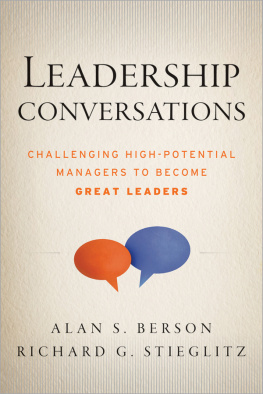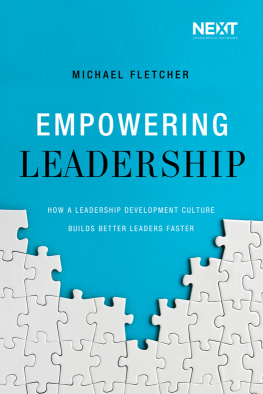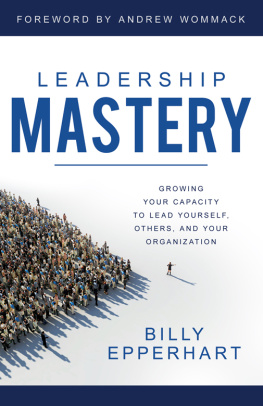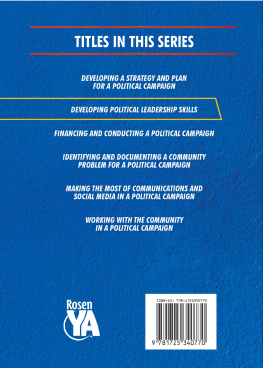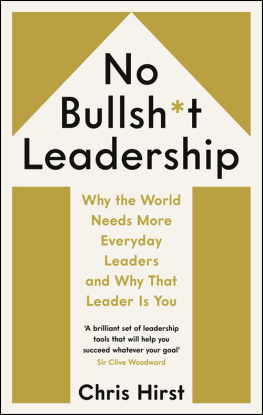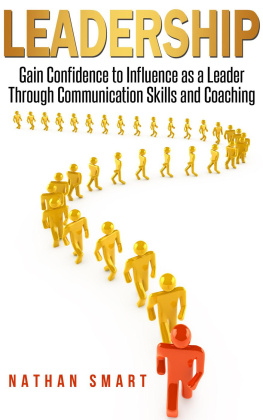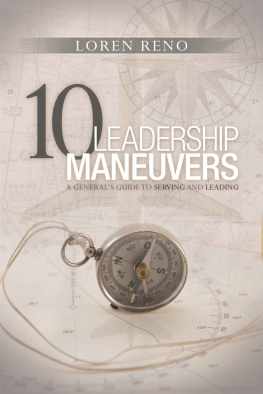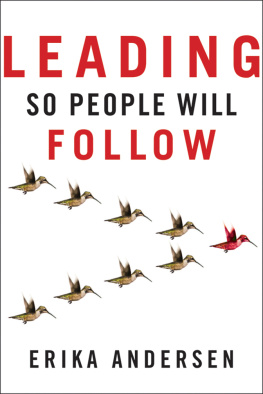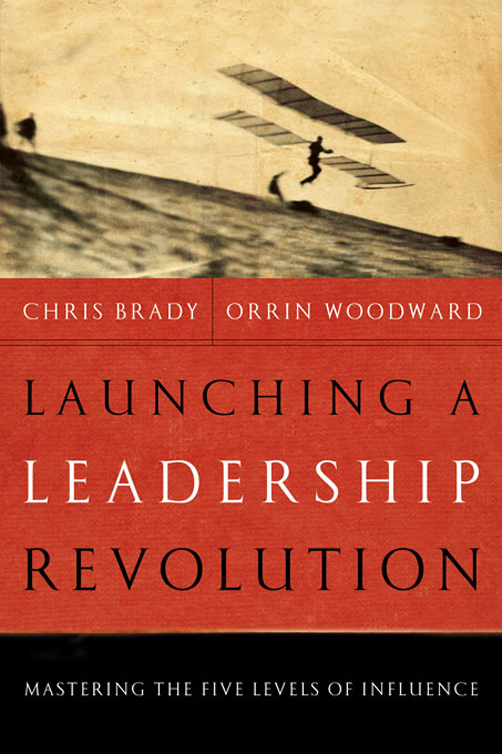Copyright 2005 by Chris Brady and Orrin Woodward
All rights reserved. Except as permitted under the U.S. Copyright Act of 1976, no part of this publication may be reproduced, distributed, or transmitted in any form or by any means, or stored in a database or retrieval system, without the prior written permission of the publisher.
Business Plus
Hachette Book Group
237 Park Avenue
New York, NY 10017
Visit our website at www.HachetteBookGroup.com.
The Business Plus name and logo are trademarks of Hachette Book Group, Inc.
First eBook Edition: September 2007
ISBN: 978-0-446-40881-3
Revolutionary moments attract those who are not good enough for established institutions as well as those who are too good for them.
George Bernard Shaw
The greatest revolution of our generation is the discovery that human beings, by changing the inner attitudes of their minds, can change the outer aspects of their lives.
William James
Twenty years from now you will be more disappointed by the things that you didnt do than by the ones you did do. So throw off the bowlines. Sail away from the safe harbor. Catch the trade winds in your sails. Explore. Dream. Discover.
Mark Twain
Revolution is not a dinner party.
Sun Yat-sen
W hen writing a book such as this, authors run the risk of appearing as if they think they know everything. Before the reader jumps to any such conclusion, allow us the disclaimer that we struggle daily to implement and improve our abilities with the concepts contained in these pages. The material presented here is not theory, but rather real-life experience from the perspective of two businessmen who must live it every day. We have experienced much and learned even more in over a decade of business enterprise together, and would have been helped significantly along the way had the information in these pages been available in this form. For that reason, we decided to write this book.
The second risk run by authors is appearing to work alone. Nothing could be further from the truth. We are indebted to many writers and leaders both contemporary and deceased, speakers, teachers, and mentors from whom weve drawn heavily. The bibliography at the back of this book lists those from whom weve selected quotes and major material concepts. In particular, we wish to salute John Maxwell and Jim Collins for illuminating the idea of Leadership Levels. We dont know which, if either, first penned the concept, but we have been inspired by the profound insight and perspective provided by both. High on the list of those to whom we owe gratitude is our patient editor and literary mentor Rick Wolff. He has shown us a whole new world of which we are glad to be a part. We also want to thank our friend Pastor Robert Dickie for his spiritual mentorship and friendship throughout the years; his example is the best sermon of all. Our wives, Terri Brady and Laurie Woodward, who somehow manage to be beautiful, loving, flexible, understanding, and encouraging all at the same time, deserve our special thanks and gratitude. Additional thanks goes to Terri Brady for painstaking supervision of the early editing of this manuscript. We are also indebted to our business partners Tim Marks and Larry Van BusKirk for keen insights that made the book much better. Thanks also are due Russ Mack for believing in the big picture of this manuscript from the beginning. Chris wants to thank his parents, Jim and Gayle Brady, and Orrin wishes to thank his parents, Bud (deceased) and Kathy Woodward, for their constant belief and encouragement. Norm Williams, our graphic designer and artist, deserves recognition for responding patiently to our many directives and ongoing changes. We would also like to give a nod to all the hours contributed by Bob Dickie III and his staff, and to Doug and Tiffany Huber, who have faithfully served in various capacities behind the scenes.
Most importantly, we wish to give all glory to our Lord and Savior, Jesus Christ. Everything we have and will ever accomplish is by His grace.
J ust before the Great Depression a man named Ira Yates sold his profitable business to return to the ranching life he had known growing up. He bought a thousand acres in west Texas and struggled through the years of the Depression, barely able to make a living. As he heard rumors of Texas oil fields being discovered, he decided to drill on his ranch, but had difficulty getting oil companies to assist him with the complicated process. Finally, Yates set up a test rig and found that he was living above one of the largest oil fields in North America. His fortune was made.
Leadership ability is a lot like the drilling equipment used by Yates and his partners to discover the richness of oil that already existed beneath him. Each of us has a natural wellspring of talent and ability buried within. The drill of leadership is required to tap into the geyser of our potential. As with Yatess drilling equipment, leadership ability will take effort to attain, but the rewards are incalculable.
Everyone is called upon to lead in some capacity sooner or later in life. Some of the issues involved are big, some are small. Sometimes the responsibilities requiring leadership last a lifetime, and sometimes they are needed only for a moment. Leadership, then, is something each of us should strive to understand better and utilize more fully. Whether in a corporate setting, a business of our own, a church environment, a volunteer organization, or in the home, improving our leadership abilities through the development process described in this book is key to unleashing the potential hidden within. Helping to guide others through the same process is the secret to collective greatness and organizational victories.
Increasing our ability to lead requires change. Vital to tapping into our inner wells of potential are the willingness and ability to grow personally and organizationally. James C. Hunter wrote, I never cease to be amazed that organizations do not insist that their leaders be continually improving and persistently working toward becoming the best leaders they can be. With the awesome responsibility of leading others and the high stakes involved, it seems obvious to me that organizations would focus their attention on helping their leaders develop their leadership skills and thereby their character.
We wrote this book because our work with tens of thousands of entrepreneurs across North America for more than a decade has convinced us that most people (and their organizations) have much more potential locked away inside of them than they realize. Leadership is the key that opens the lock on that potential. Time and again we have seen people come alive and achieve things they never thought possible, once they started learning to take responsibility for leadership. The results, quite frankly, have been revolutionary.
Noel Tichy wrote, In a broad sense, what leaders do is stage revolutions. The term revolution is defined by Webster as an activity or movement designed to effect fundamental changes. In the beginning, revolutions begin with unrest on the part of one person or perhaps a small group of individuals. These early leaders begin working to influence events in a direction that assaults the status quo. Things can no longer remain as they were. Changes must be made. Usually because of their passion for the ideals espoused by the leaders, other people are drawn into the effort. Gradually, the strivings of these early initiators gain momentum, attracting talent and support from broader and broader areas. As a tiny campfire grows into a large bonfire with increased fuel and oxygen supply, so too does a revolution grow in power and potency as fundamental changes are made and the results of those changes begin to surface.


